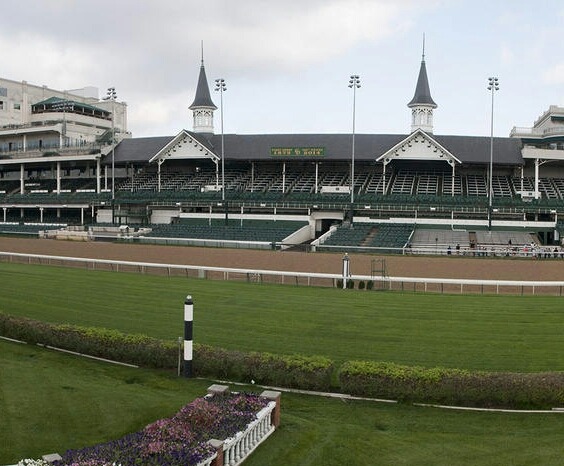
Should the Kentucky Derby and Kentucky Oaks lose graded stakes status by rule?
Did Churchill Downs think through the “Bob Baffert” Kentucky Derby and Kentucky Oaks ban rule?
It sounds like a crazy question, I know. What I don’t know is what the correct answer is. Sure, we all know nobody wants to see the most exciting two minutes in sports, the Kentucky Derby, and the female counterpart, the Kentucky Oaks, downgraded, but rules are rules are they not?
They say rules are made to be broken. When the people who make the rules break the rules are there really any rules at all?
Bob Baffert trained horses are barred from earning any Kentucky Derby or Kentucky Oaks points, even if they win Derby and Oaks point races. Newgrange and Messier already have. Those points are being held in limbo so to speak and not being awarded. This is to prevent Bob Baffert from running in the two Churchill Downs marquee events and arguably the most famous race in the world. Horses who finish behind Bob Baffert horses are eligible and are receiving the points awarded for their placings in point races. This is the reality of how the situation is playing out.
When Churchill Downs changed the criteria for running in the Kentucky Derby from graded stakes earnings to the current point system it was done for two primary reasons. First to insure the best of the best three-year olds were in the gate on the first Saturday in May. Next was to prevent sheer sprinters from running in the Derby and creating false or odd pace scenarios. Until now you could argue the system worked. I am not sure we can say it is working this year and possibly next year. Obviously, there are some better horses at the top of the class in Bob Baffert’s barn. Corniche, Messier, and Newgrange immediately come to mind. Corniche is the two-year old Breeders’ Cup winning Eclipse Champion. Messier won the Grade 3 Robert Lewis by a dominant 15 lengths. Newgrange won the Southwest and is the Rebel favorite this weekend. You would be hard pressed to argue these three are not better horses being restricted from the Kentucky Derby in favor of lesser horses.
Back to the original question, should the Kentucky Derby and Kentucky Oaks lose graded stakes status or be downgraded based on the Bob Baffert ban? What do the rules say?
The following is direct from the Thoroughbred Owners and Breeders TOBA website under the heading of Grading Procedure:
The American Graded Stakes Committee was founded by TOBA in 1973 and has been managed by the organization for the last 49 years. The purpose of the committee is to provide owners and breeders of Thoroughbred horses a reliable guide to the relative quality of Thoroughbred bloodstock by identifying those races whose recent renewals have consistently attracted the highest quality competition.
The grading of races is conducted at meetings duly called by the Chairman, usually in late November or early December. Other meetings are called as necessary. For the grading of races, committee members are provided information prepared by The Jockey Club Information Systems, Thoro-Graph and TOBA. Statistical information is provided for all races eligible to be graded, aiming at a Breeders’ Cup-to-Breeders’ Cup year. This information details statistics of graded and other eligible races. Amendments in extent and type of information may be directed from time to time by vote of the entire Committee and are put into effect pending appropriate funding and computer programming provisions.
All grades issued, denied, or altered are voted upon by a quorum of the Committee at a duly called meeting. A quorum, for the purpose of grading races, is a majority of TOBA members on the Committee and a majority of Racing Officials on the Committee. Eight affirmative votes are required to upgrade any race and six affirmative votes are required to downgrade a race.
Criteria for Consideration for Grading
To aid the Committee in determining which races should be considered for grading, the Committee has adopted the following criteria for screening American races:
Restricted races – Races will be ineligible for grading if conditions for competing in them include restrictive provisions relative to which horses may enter, other than by sex or age. A race is regarded as a restricted race if any of its conditions for entry would tend to exclude better horses while allowing participation by lesser horses. Beginning in 2018, races restricted to non-winners of a sweepstakes and meeting all other eligibility requirements are eligible for Listed status.
Graded Stakes Committee TOBA website
It appears the Kentucky Derby and the Kentucky Oaks are indeed restricted this year and next.
For clarification I contacted Andy Schweigardt, Senior Director of Industry Relations & Development for TOBA. Andy has been Director of Industry Relations and Development at TOBA since October 2000. He is currently the secretary of the American Graded Stakes Committee and is a director of the Racing Medication and Testing Consortium.
Andy admitted my question was not something he had considered or thought about prior to my raising it. We agreed it was an interesting perspective and question. After pondering the question and reviewing the rule Andy’s position and understanding was the following:
My thought is that rule’s intent is for the narrow window of the race conditions as they would appear in the condition book.
Andy Schweigardt
We agreed the rule was written without the foresight of the situation surrounding Bob Baffert and the current Kentucky Derby and Oaks ban. We further agreed it would have been almost impossible to anticipate such a scenario when the rule was written. We agreed it was an interesting question and topic of conversation that has not been brought up or discussed previously to either of our knowledge.
I suggested Churchill Downs was perhaps premature or did not think through how they structured the ban. Andy did not necessarily agree in whole with that take but conceded it possibly could have been structured better in accordance with that rule. He did reiterate his interpretation is the intent of the rule is for the narrow confinement of the condition book. That may be, but the practicality of how it is playing out is precisely what the rule says should not happen, excluding better horses in favor of lesser horses in possibly the most significant race on our calendar.
Is the Kentucky Derby still a true Grade 1 being a restricted race allowing lesser horses to run and excluding better horses? I think it is an interesting question. We all know the significance of the race for breeding, for sponsors, for exposure and to showcase our sport at the highest level. We have a lot of talk about integrity, transparency and rules, but do we as an industry walk the walk fairly or only when and if it suits us? Will anyone care?
A lot of people will see this article about Bob Baffert. It isn’t. They won’t be able to get past his name which we all know spurs a lot of passion and emotion. This is about a poorly worded rule that can potentially affect the grading status and process. It is not about any trainer, any owner or the choice of any owner. It is about lesser horses being given preference over better horses and whether by their own rule that impacts the the status of a graded race, and in this case the Kentucky Derby and Kentucky Oaks.
This is all this is about:
Restricted races – Races will be ineligible for grading if conditions for competing in them include restrictive provisions relative to which horses may enter, other than by sex or age. A race is regarded as a restricted race if any of its conditions for entry would tend to exclude better horses while allowing participation by lesser horses.
The rule reads as it doesn’t matter who trains, or who owns the horses, or even why they are being restricted. “Tend to exclude” is extremely poor language for a rule. It doesn’t matter if you, I, Bob Baffert or Mr. Magoo train them. As I stated at the onset, I know it sounds crazy, and I don’t profess to know the definitive answer. I do see it as a question that is owed clarification for all participants in the Kentucky Derby, present, future, and even past.
The following is the Bob Baffert Churchill Downs Kentucky Derby and Kentucky Oaks ban language:
Effective Sept. 30, 2021, points from any race in the Road to the Kentucky Derby or Kentucky Oaks will not be awarded to any horse trained by any individual who is suspended from racing in the 2022 Kentucky Derby or 2022 Kentucky Oaks or any trainer directly or indirectly employed, supervised, or advised by a suspended trainer. Should a horse trained by a suspended trainer, or any trainer directly or indirectly employed, supervised, or advised by a suspended trainer, finish in a position that would have earned points in a Road to the Kentucky Derby or Kentucky Oaks race occurring after Sept. 30, 2021, the points associated with that finish position will be vacated.
Churchill Downs CDI
The language of the ban, and the language of the graded stakes committee appear to conflict. Bob Baffert is the only trainer this applies to even though there are several other trainers with more violations, and violations of higher classifications.
The high road is often a lonely place. Many times we walk it alone if at all. We’re never really alone though, are we, if we take the high road? There is someone there with us. I never liked the pile on, gloat, or kick when down way. I prefer a hard pass on that. Churchill Downs chose to allow access and photographs of Medina Spirit’s Kentucky Derby winning plaque being removed and Mandaloun’s replacing it. I’d have done it at night with no photo access allowed.
I know you are what your record says you are, but does anyone think Mandaloun won the Kentucky Derby anyway?




